|
De Amerikaanse schrijver Chaim Potok werd geboren in New York City op 17 februari 1929. Zie ook mijn blog van 17 februari 2007 Zie ook mijn blog van 17 februari 2008 en ook mijn blog van 17 februari 2009 en ook mijn blog van 17 februari 2010.xml:namespace prefix = o ns = "urn:schemas-microsoft-com:office:office" />
Uit: My name is Asher Lev
My father's great-great-grandfather was in his early years the manager of the vast estates of a carousing Russian nobleman who when drunk sometimes killed serfs; once, in an act of wild drunkenness, he burned down a village and people died. You see how a goy behaves, I would be told by my father and mother. The people of the sitra achra behave this way. They are evil and from the Other Side. Jews do not behave this way. My father's great-great-grandfather had transformed those estates into a source of immense wealth for his employer as well as himself. In his middle years, he began to travel. Why did he travel so much? I would ask. To do good deeds and bring the Master of the Universe into the world, my father would respond. To find people in need and to comfort and help them, my mother would say. I was told about him so often during my very early years that he began to appear quite frequently in my dreams: a man of mythic dimensions, tall, dark-bearded, powerful of mind and body; a brilliant entrepreneur; a beneficent supporter of academies of learning; a legendary traveler, and author of the Hebrew work Journeys to Distant Lands. That great man would come to me in my dreams and echo my father's queries about the latest bare wall I had decorated and the sacred margins I had that day filled with drawings. It was no joy waking up after a dream about that man. He left a taste of thunder in my mouth.
My father's father, the man whose name I bear, was a scholar and recluse in his early and middle years, a dweller in the study halls of synagogues and academies. He was never described to me, but I pictured him as slight of body and huge of head, with eyelids swollen from lack of sleep, face pale, lips dry, the veins showing blue along his cheeks and temples. In his youth, he earned the name "ilui," genius, a term not lightly bestowed by the Jews of Eastern Europe. And by the time he was twenty he had come to be known as the Genius of Mozyr, after the Russian town in which he lived. Shortly before his fiftieth birthday, he abruptly and mysteriously left Mozyr and, with his wife and children, journeyed to Ladov and became a member of the Russian Hasidic sect led by the Rebbe of Ladov. He began to travel throughout the Soviet Union as an emissary of the Rebbe. Why did he travel so much? I once asked. To bring the Master of the Universe into the world, my father replied.
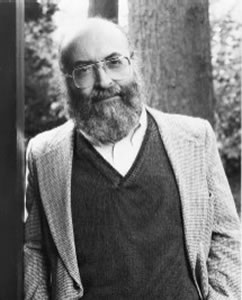
Chaim Potok (17 februari 1929 23 juli 2002)
De Japanse schrijver Mori Ōgai werd geboren op 17 februari 1862 als Mori Rintaro in het dorpTsuwano in Iwami. Zie ook mijn blog van 17 februari 2010.
Uit: The Wild Geese (Vertaald door Kingo Ochiai en Sanford Goldstein)
A good-looking face may influence others, but it alone does not carry weight in a boardinghouse. Personal be- havior must also be considered, and I doubt if many students lived as well-balanced a life as Okada did. He wasn't a bookworm who worked greedily for examination marks each term and who wanted to win a scholarship. Okada did the required amount of work and was never lower than the middle of his class. And in his free time he always relaxed. After supper he would take a walk and would return without fail before ten. On Sun-days he rowed or set off on a long hike. Except for periods
of living with his crew before a match or of returning to his home in the country for summer vacations, the time never varied when he was in or out of his room. Often a boarder who had forgotten to set his watch by the signal gun at noon went to Okada's room to find out the time.
And occasionally even the office clock in the Kamijo was put right by Okada. The more we observed him, the stronger became our impression that he was reliable. Even though Okada didn't flatter the landlady or spend much money above his room and board, she began to praise him. Needless to say, the fact that he paid his rent regularly was one of the reasons for her attitude.
She often said: "Look at Mr. Okada!"
But, anticipating her words, some of the students would say: "Well, we can't all be like him."
Before anyone realized it, Okada had become a model tenant.
Okada had regular routes for his daily walks. He would go down the lonely slope called Muenzaka and travel north along Shinobazu Pond. Then he would stroll up the hill in Ueno Park. Next he went down to Hirokoji and, turning into Naka-cho--narrow, crowded, full of activity --he would go through the compound of Yushima Shrine and set out for the Kamijo after passing the gloomy Karatachi Temple. Sometimes he made a slight variation in a particular route, such as a right turn at the end of Naka-cho, so that he would come back to his room along the silence and loneliness of Muenzaka.
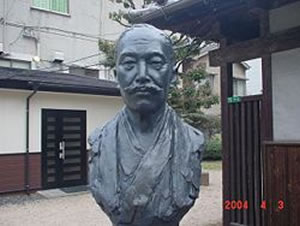
Mori Ōgai (17 februari 1862 9 juli 1922)
Beeld in Kokura Kita
De Spaanse dichter Gustavo Adolfo Bécquer werd op 17 februari 1836 in Sevilla geboren. Zie ook mijn blog van 17 februari 2007 en ook mijn blog van 17 februari 2008 en ook mijn blog van 17 februari 2009 en ook mijn blog van 17 februari 2010.
Schwebende Wolke, duftig und rein
Schwebende Wolke, duftig und rein
Silberne Welle in Mondenschein
Inniges Lied,
Das aufwärts zieht,
Kosender Wind und sein Rauschen dazu,
- Ja - das bist du.
Ein Schatten, du, der aus Äther gesponnen,
Der, will ich ihn fassen, jählings zerronnen,
Wie zuckendes Leuchten, rauschendes Tönen,
Wallender Nebel, heimliches Stöhnen
Der blauen See.
Meer ohne Küste, treibender Schaum,
Irrender Stern im endlosen Raum,
Heiserer Laut
Der Windesbraut,
Sehnende Angst um ein Glück das verblich, -
Ja - das bin ich.
Ich, der den brechenden Blick nicht vermag
Von dir zu wenden bei Nacht und bei Tag,
Der ein Nichts, ein Phantom, einen Schatten umwirbt,
Und heimatlos irrt und ruhelos stirbt,
- Um einen Traum!
Heut stieg der Himmel
Heut stieg der Himmel auf die Erde wieder, -
Heut kränkt mich nicht des Schicksals Hohn und Spott, -
Heut sah ich sie, und sie - sie sah mich wieder, -
Heut glaube ich an Gott! ...
Vertaald door Richard Jordan
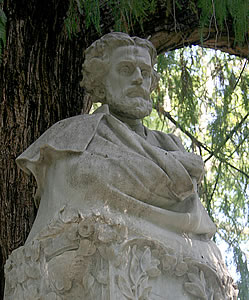
Gustavo Adolfo Bécquer (17 februari 1836 22 december 1870)
Monument in Sevilla (Detail)
De Duitse dichter en schrijver Georg Britting werd op 17 februari 1891 geboren in Regensburg. Zie ook mijn blog van 17 februari 2007 en ook mijn blog van 17 februari 2009 en ook mijn blog van 17 februari 2010.
Uit: Eglseder
Der kleine, schnellfüßige Mann mit den feurigen Augen war der uneheliche Sohn einer Dienstmagd aus dem Bayerischen Wald. Auf einem Einödhof, nahe der böhmischen Grenze, hatte er das Licht der Welt erblickt. »Das Licht ist aber ziemlich dunkel dort«, sagte er, »schon mehr eine Finsternis!« Maria Walburga Theresia Eglseder, die Mutter, die bald nach der Geburt gestorben war, am Kindbettfieber, hatte den Namen des Kindsvaters nicht zu nennen gewußt, oder sie hatte ihn nicht nennen wollen. »Vielleicht war der ein Böhmak«, vermutete Eglseder, »ein Mausefallenhändler oder ein wandernder Musikant.« Das war ohne Wichtigkeit für ihn, er hatte keinen Ahnenstolz. Daß seine Mutter gleich drei Vornamen gehabt habe! sagten wir. »So ists, so stehts in meinen Papieren«, antwortete er, »aber sonst hatte sie wenig, das heißt, sie hatte nichts. Sie war arm wie eine Kirchenmaus. Ich muß mich mit einem Vornamen durchs Leben schlagen, so sparsam war sie, in dieser Beziehung wenigstens, oder es war Bescheidenheit. Auf den Namen Georg bin ich christkatholisch getauft. Es hat aber nicht viel genützt«, sagte er, »das Wasser machte mich nur naß.« Er lachte.
Die Frucht der Sünde, mit des Drachentöters Namen, wurde in einem Waisenhaus aufgezogen, fromm und fröstelnd, und lernte das Einmaleins und sein Bett selber zu machen und das Rosenkranzbeten. Mit vierzehn Jahren wurde Eglseder in die Schneiderlehre getan. »Man fragte mich nicht lange«, sagte er, »was ich Lust hätte zu werden, wir waren alle armer Leute Kinder, man verfuhr mit uns, wie man nur eben wollte, und zu einem Schmied, weiß Gott, hätte ich auch nicht getaugt! Ein schmächtiges Knäblein war ich, könnt ihr euch ausmalen, aber zum Zwirneinfädeln, dazu reichte es, und ich war dann sogar gern ein Schneider, und kein schlechter.«
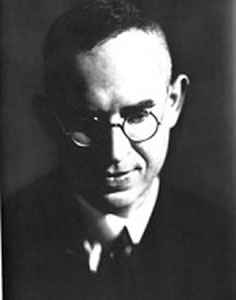
Georg Britting (7 februari 1891- 27 april 1964)
De Australische dichter Andrew Barton "Banjo" Paterson werd geboren op 17 februari 1864 in Narambla in New South Wales. Zie ook mijn blog van 17 februari 2007 en ook mijn blog van 17 februari 2010.
At the Melting of the Snow
There's a sunny Southern land,
And it's there that I would be
Where the big hills stand,
In the South Countrie!
When the wattles bloom again,
Then it's time for us to go
To the old Monaro country
At the melting of the snow.
To the East or to the West,
Or wherever you may be,
You will find no place
Like the South Countrie.
For the skies are blue above,
And the grass is green below,
In the old Monaro country
At the melting of the snow.
Now the team is in the plough,
And the thrushes start to sing,
And the pigeons on the bough
Sit a-welcoming the Spring.
So come, my comrades all,
Let us saddle up and go
To the old Monaro country
At the melting of the snow.
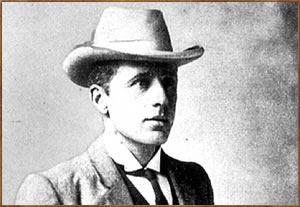
Andrew Paterson (17 februari 1864 5 april 1941)
De Amerikaanse schrijfster Margaret Truman werd geboren op 17 februari 1924 in Independence, Missouri. Zie ook mijn blog van 17 februari 2010.
Uit: The President's House
Once, one of these brides married a president. I am speaking of Frances Folsom and Grover Cleveland. A century or so ago, when I was a twenty-something, I had the pleasure of meeting Mrs. Cleveland, who told me the reason she was married in the White House instead of in her family home: Nowhere else could she and the president have their privacy guaranteed.
The old house is, to put it mildly, a paradoxical place. People who think in straight lines have a very difficult time adjusting to it. And as history has shown again and again, many of them never do. Even so, I think everyone who has ever lived in the White House would agree that it's a special experience--a unique combination of history, tragedy, comedy, melodrama, and the ups and downs of ordinary living all under one roof.
II
Men bearing that unique title, president of the United States, the office my father called "the greatest in the history of the world," have paced the White House's darkened halls in periods of national crisis, gazing at portraits of their predecessors on the walls, seeking communion with their triumphs--or shuddering at their blunders. Women reached out to these men, trying to offer them guidance, or at the very least solace for their awesome burdens. My mother managed to play both roles in my father's presidency--a feat too many obtuse historians and biographers have failed to recognize.
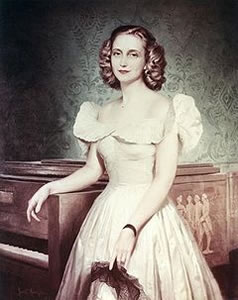
Margaret Truman (17 februari 1924 29 januari 2008)
Portret door Greta Kempton
|



